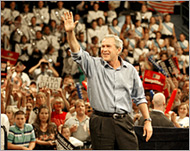Poll: Kerry closing ‘religion gap’
A majority of Americans still give the Republican Party the advantage on the issue of religion, but John Kerry may be gaining ground on President Bush, according to a Pew Research Center poll.

Roughly five in ten respondents in the survey said the Republican Party was “friendly toward religion”, versus 40% who said so about the Democratic Party.
Such attitudes would appear to be favourable for Bush’s re-election campaign, as more than 70% of voters say it is important that a president have “strong religious beliefs”.
The Democratic team, however, has reason to be somewhat optimistic about Kerry’s efforts to close the so-called religion gap, according to one official who helped oversee the poll.
Moral climate
One of the principle reasons why religion is widely considered to be important in presidential elections is that many voters equate religious faith with morality, experts say.
 |
|
Scholars say Bush still has a solid |
Nearly 65% of voters in the Pew poll said “moral values” would be important in determining their vote. When asked which candidate could do a better job of improving the country’s “moral climate”, 45% said Kerry compared to 41% for Bush.
That could be a sign Kerry is doing a better job of convincing voters that his campaign is not devoid of a faith-based message, said Luis Lugo, director of the Pew Forum on Religion & Public Life, which co-produced the survey of 1512 adults from August 5-10.
“I think [Kerry] has made headway,” Lugo said.
Nevertheless, many political scholars said Bush maintained a solid advantage with religious voters.
Frequent mentions
With the exception of the black community, many of whom are devoutly religious Christians, the majority of dedicated church-goers fall firmly in the Republican camp, says Mark Rozell, an expert on religion and politics at George Mason University.
“I don’t think that Kerry has improved his standing among highly religious types in the electorate,” Rozell said. “Regular church-going types are just solidly Republican.”
“No doubt a lot of [Kerry’s perceived advantage on morality] has a lot to do with the whole controversy over not finding weapons of mass destruction in Iraq” Luis Lugo, |
Both Lugo and Rozell said the fact that more voters gave Kerry the edge on the morality question could be driven more by the situation in Iraq than issues related to religion and values.
“No doubt a lot of [Kerry’s perceived advantage on morality] has a lot to do with the whole controversy over not finding weapons of mass destruction in Iraq,” Lugo said. “Certainly it does with Democrats.”
Clyde Wilcox, a professor of government at Georgetown University, said at least some of Kerry’s lead in the poll’s morality question could be attributed to his more frequent mentions of faith in recent speeches.
“Honestly, the result surprises me a bit,” Wilcox said. “I think that Kerry did what he had to do at the [Democratic] convention – say that he was religious.”
Clear pitch
In his acceptance speech at the Democratic National Convention Kerry made a clear pitch to religious voters, saying “faith” was an important part of his life.
“I don’t wear my own faith on my sleeve,” Kerry said. “But faith has given me values and hope to live by, from Vietnam to this day, from Sunday to Sunday.”
 |
|
The situation in Iraq has trumped |
Voters in the Pew poll were asked if they felt the two candidates mentioned religion too much or too little in their campaigns.
While the number of people who said Bush mentioned religion “the right amount” dropped to 53% from 62% in a similar poll in July, 56% said Kerry mentioned his faith the right amount, an improvement for him, Lugo said.
“Some people who have soured on [Bush’s] policies have also soured on his frequent mentions of faith,” Lugo said. “Kerry has almost caught him.”
While many experts say the economy, the situation in Iraq and the “war on terrorism” will be the major issues influencing the small yet crucial block of undecided voters, religion could be an important factor for both candidates in securing large voter turnouts among their respective bases.
Swing voters
“This is going to turn on the ability of both sides to get out the vote of people who support them,” Lugo says.
For the Bush team, that means pushing certain cultural “wedge” issues such as gay marriage and abortion rights that are particularly important to Evangelical Christians.
Numerous polls show that a majority of voters oppose legalising gay marriage and Bush has proposed a constitutional ban on same-sex marriages.
“I don’t think that Mark Rozell, religion and politics expert, George Mason University |
Kerry, on the other hand, may be able to gain points from the debate over stem cell research, which he supports and Bush has generally opposed.
According to the Pew poll, 52% of voters support the use of embryonic stem cell research to pursue potential medical breakthroughs, while 34% say stem cells should never be destroyed for scientific purposes.
Most Christian conservatives are fiercely opposed to stem cell research, yet swing voters are closer to Kerry’s position on the issue, the Pew survey showed.